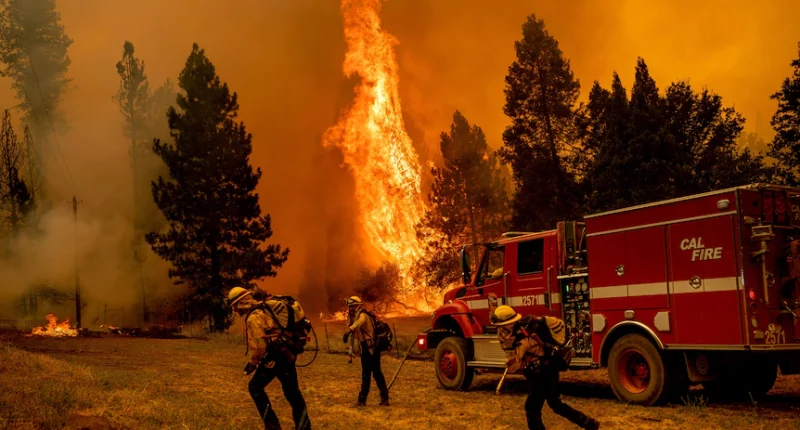A ferocious wildfire in the foothills of the Sierra Nevada raged uncontained on Sunday, forcing thousands of residents from their homes in the gateway to Yosemite national park.
The Oak fire started on Friday near the town of Midpines, California, and exploded in size over the weekend.
Burning through dense and dry vegetation on the region’s steep and rugged hillsides, the blaze was fanned by gusty winds and temperatures that hovered around 100F (38C). The extreme nature of the fire meant it turned tall trees into match-sticks and sent billowing black smoke curling over the quaint historic downtown of Mariposa.
It remained at 0% containment Sunday night, despite a heavily resourced firefighting effort. Since Friday, it had consumed more than 15,000 acres. More than 3,000 people were under evacuation orders.
More than 2,000 first responders from state and federal agencies were battling the blaze, attacking it both from the ground and the air. At least 10 homes and other structures had been destroyed, with thousands remaining at risk in its path.
“The growth of this fire is pretty amazing given the fact of how quickly we had resources here,” said Chief Mike van Loben Sels of the Madera Merced Mariposa unit of California’s Fire and Forestry Protection (Cal Fire). He noted that embers and spot fires were igniting more than a mile ahead of the blaze. “We really threw everything at this thing from the beginning,” he said.
The fire is one of the dozens burning across the American West as the region braces for peak fire-risk months that still lie ahead. More than 5.5m acres have already burned in the US this year, roughly 70% more than the 10-year average.
California, a state that in recent years has faced intensifying threats from behemoth blazes, had seen a lighter-than-normal start to its highest-risk season. Spring rains offered a reprieve, delaying the onset of what officials still fear will be another devastating fire year. The Oak fire has showcased how quickly things can change.
On Sunday the California governor, Gavin Newsom, declared a state of emergency for the area, allowing for the deployment of thousands of emergency personnel.
The cause of the fire remains under investigation.
Thousands of residents and visitors were ordered to evacuate after the fire erupted, some fleeing so quickly that they were not able to pack essentials. In the chaos, a local man named Ron, who declined to share his last name, left behind his medication and his dog Duke, an aging labrador mix with a bad hip.
“When he was left behind I couldn’t get anybody to help,” Ron said, adding that he had suffered a stroke and still gets disoriented. “But that’s my baby, man.”
Fire captains Shayon Ascarie and David Jessen came to Ron’s aid, rushing the man back to his evacuated hillside home as the fire crept closer. Helicopters zigzagged overhead and planes dropped fire retardant on the slopes above as the firefighters helped Ron wrangle the terrified Duke into the back of their pickup and grab his pill boxes, before they ferried the duo back down the mountain to safety.
Jessen and Ascarie, who hail from different parts of California but were assigned as partners for the incident, spent the rest of the morning traversing through the towns to post the latest maps and answer questions for a public hungry for information. Along with supplying essential intel, big-incident firefights also often require rescues like Duke’s. “It is part of the job, you are just in the right place at the right time,” Jessen said, adding: “I have a feeling this isn’t going to be the last one.”
Throughout the town of Mariposa, people huddled around their A-frame information posts sharing stories and offering their thanks for the ongoing firefighting effort. Flags flapped overhead, turning what might have otherwise been a breezy reprieve on a hot summer’s day into another foreboding sign that the fire loomed close.
Further up the highway, a roadside diner called Steve’s Sportsman’s Café had become a de facto hub for locals, both those displaced by the fire and others watching and waiting. Outside, a motorcyclist shared videos of his harrowing close call with the fire. It spared his home but claimed his shed, where priceless keepsakes – his grandfather’s fishing poles and guns – had been housed. “Still, it could have been a lot worse,” he said, shaking his head as he walked into the restaurant.
From behind the cash register, Tracy Heidseck dished details on how power outages caused by the blaze did their own kind of damage. “We already lost all our food in our fridge and our freezers,” she said, adding that her well had also run dry and there wasn’t even water to flush toilets. This was one part of fire threats, which she said loom large year after year, that takes a toll. “I am just exhausted,” she said. “I have no water and no power.”
But the community – and the restaurant – have come together during this trying time. Steve Knauf, who owns the diner, ambled over to offer his support. “There’s been a lot of hugs and tears the last couple of days,” he said, adding: “But, it is like one big family in here.”
Source:theguardian.com





